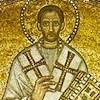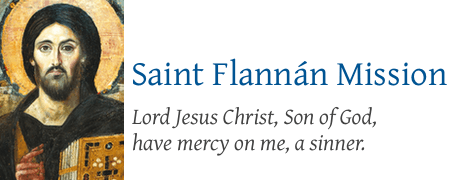 In the Name of the Father and of the Son and of the Holy Spirit, one God. Amen. Dear beloved, let us remember the Holy Wonderworkers Cosmas and Daimian of Mesopotamia and their mother St Theodota, St John and St James of Persia, and St Hermeningilda the Goth. Holy saints and martyrs, pray for us!
In the Name of the Father and of the Son and of the Holy Spirit, one God. Amen. Dear beloved, let us remember the Holy Wonderworkers Cosmas and Daimian of Mesopotamia and their mother St Theodota, St John and St James of Persia, and St Hermeningilda the Goth. Holy saints and martyrs, pray for us!
St Hermingeld was a prince of the Goths (Teutonic) from Spain, who turned from heresy to Orthodoxy. Although his own father the emperor remained a heretic and tried all means to change the mind of his son Hermingeld, the saint was unwavering. The emperor then ordered his own son’s execution, and the saint earned the crown of martyrdom in the year 586.
We face chilling and challenging winters throughout this year and the last, winters of economic uncertainty and global depression. No one seems to be exempt from this chilling winters and storms, not the mighty, not the wealthy, not the poor, not the weak. So how do we brave these storms as faithful Christians?
St John Chrysostom (the “Golden Mouth”) comes to mind, in his letters to St Olympia the deaconess.
The holy Deaconess Olympia was a beautiful lady who came from a wealthy family. She was married to a good husband, who died before consummation with Olympia. St Olympia the deaconess would repose as a virgin, a servant of the Church. The deaconess was a unique vocation quite distinct from the holy priesthood orders of bishop, priest and deacon.
The holy father St John Chrysostom, Patriarch of Constantinople, gave protection to the community of sisters under St Olympia’s care. St John would often teach the sisters and St Olympia.
When the politics of the day took hold and Patriarch St John was exiled to Armenia, he corresponded with St Olympia through letters. St Olympia was troubled because the holy father St John was taken away, and spiritual darkness enveloped her locale.
St John was the loving holy father to the deaconess, especially evident through his salutation in his letters to her, letters of encouragement and inspiration, “To my lady, the most reverend and divinely favored Deaconess Olympia, I, John, Bishop, send greeting in the Lord!”
St Olympia was so depressed that she even thought of ending her life. Even though St John was himself very ill, encouraged and admonished her:
“Do not think that to pray for death exempts one from blame. Listen to the admonition of St Paul, ‘For I am hard pressed between the two, having a desire to depart and be with Christ, which is far better. Nevertheless, to remain in the flesh is more needful for you’ [Philippians 1:23-24]. For in proportion as the strain of the affliction is increased are the garlands of victory multiplied; in proportion as gold is heated does it becomes purified… for it is a bright wreath of victory for the just, shining far above the brightness of the sun, and it is the greatest means of purification for those who have sinned.” St John followed up by sending his written treatise “No One Can Harm The Man Who Does Not Injure Himself.”
Those are truly encouraging words from the holy St John Chrysostom, and even the title of his written treatise was meaningful and insightful – if we clean our yard of our passions and never injure ourselves by thoughts of death, or by action and thoughts that would detract us from our journeys towards God, harm is far from us.
Even as the suffering and tribulations of St Olympia increased as St John Chrysostom also suffered greatly, St John kept up his fatherly encouragement right up to before he reposed:
“As you are acquainted with suffering, you have reason to rejoice, in as much as by living constantly in tribulation, you have walked on the road of crowns and laurels. You have borne all manners of physical diseases more cruel and more difficult than enduring death. You have been overwhelmed with slander, insults and injuries, and continued to face new tribulation. Tears are your constant companion. And among all these tribulations, just one single affliction is sufficient to crown your soul with spiritual riches. I cannot cease to call you blessed. The patience and dignity with which you have borne your sorrows, the prudence and wisdom with which you have managed delicate situations, and the charity you have shown those who persecute you with malice, have won you a glory and reward which will make all your suffering seem light and transient in the presence of eternal joy.”
We reflect upon Proverbs 24:1-10 and Colossian 1:24-29, on suffering and joy. From the teachings of St John Chrysostom, we are encouraged by these powerful words that all of us who wear thorns of suffering, can be spurred to go further and closer to God every day.
St John Chrysostom has shown us the trials, suffering, pains, and tears, are not things that are meant to break us and destroy us.
We are called to be heroes and warriors, not to harm others, but to be heroes staving off our own passions, heroes by virtue of God’s tender and eternal mercy. God is with us in our times of strength, and in our times of weakness and remorse (Deuteronomy 20:1-4). He is our strength, our armor, our sword, our boots, our shield, our headgear, our salve, our sustenance. We are called to be His heroes, through His Mercy, to conquer our passions, and to earn our crowns in His Court through His Will and His Mercy.
Make the Sign of the Cross, which eradicates suffering and enemies in our spiritual quests, and call His Holy Name, “Lord Jesus Christ, Son of God, have mercy on me, a sinner”.
Let us close by praying the thanksgiving prayer:
It is truly meet to call thee blest, the Theotokos, ever blessed and most pure, and the Mother of our God. More honorable than the Cherubim, and more glorious than the Seraphim, without corruption thou gavest birth to God the Word: True Theotokos, we magnify thee.
O virgin Theotokos, rejoice; O Mary full of grace, the Lord is with thee. Blessed art thou among women, and blessed is the fruit of thy womb, for thou hast borne the Savior of our souls, Jesus Christ our Lord. Amen.
Fr Raphael+
Readings
Deuteronomy 20:1-4
Proverbs 24:1-10
St Luke 11:47-12:1
Colossians 1:24-29

